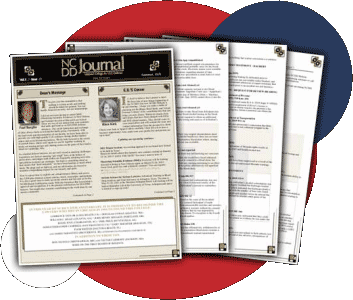- The ABA’s Concise Guide to Lawyer Specialty Certification
- Benefits to Become Board Certified - ABA Video
- Board Certified Members
- How to Become Board Certified in DUI Defense Law
- Apply for Certification
- Apply for Re-Certification Renewal
- Board Certified Senior Specialist
- Rules Governing Board Certification
- Preparing for the Exam
Standardized Field Sobriety Tests and BAC Refusals
Posted on May 04, 2023 in Uncategorized

Prepared by Jonathan Dichter - NCDD Trial Advocacy Task Force
This is a slight reworking of an idea that I've written on before, the first time nearly 10 years ago. One of the things our college is well known for is creativity and the use of science to make strides towards fairer results in court for our clients. I've argued it in a few cases and firmly believe the law and facts are on the side of the defense here. While the legal "fiction" we use in my State makes this particularly interesting - if your State uses the actual studies regarding SFSTs and lets in the science behind them this could be a gem.
Let's start with a basic question. What are SFSTs? What can they do? What can't they do?
Every State Trooper is required by their academy training to go through a course designed by the National Highway Traffic Safety Administration. This course teaches them the Standardized Field Sobriety Testing battery. These tests were studied and vetted by NHTSA in a variety of studies, both lab and field. These tests are only validated for the purposes which they were studied for. Early in the battery of DUI law, the Washington State Supreme Court acknowledged that "field sobriety tests are always used for the determination of sobriety." Heinemann v. Whitman County of Wash., Dist. Court, 105 Wash.2d 796, 718 P.2d 789 (1986). This is based on the misplaced belief that a "field sobriety test is designed to determine whether a person has the attention skills necessary for driving." State v. Lovelace, 77 Wash. App. 916, 895 P.2d 10 (Div. 1, 1995).
According to the NHTSA manual, this was one of the original goals of the the researchers. However, it was quickly determined that: "driving a motor vehicle is a very complex activity that involves a a wide variety of tasks and operator capabilities. It is unlikely that complex human performance, such as that required to safely drive an automobile, can be measured at roadside...SFSTs do not directly measure driving impairment." (emphasis added) Marceline Burns et al., NHTSA, Validation of the Standardized Field Sobriety Test Battery at BACs Below 0.10 percent, p. 28 (1998) (Found in Chapter VIII of the SFST manual).
"The intended purpose of the SFST battery is to establish probable cause for measuring the actual breath or blood alcohol concentration." (emphasis added) Joseph Manno and Barbara Manno, Experimental Basis of Psychomotor Performance Impairment, in Medical-Legal Aspects of Alcohol, p. 310 (James Garriott ed., 4th ed. 2003)
They "were never meant to be introduced as evidence in the prosecutions case." (emphasis added) In fact, NHTSA "recommends that the SFSTs be used solely during the roadside stop to establish probable cause." Am. Jur. 3d Proof of Facts § 459.10 (2007)
As is clear from the research, the validation studies, and the NHTSA manual (all of which were provided by the State - remember that - it's the STATE'S EVIDENCE that makes this argument for you), the only thing SFSTs can actually do is provide a statistical likelihood that a subject is at or above a certain BrAC. They cannot and do not predict any likelihood that a persons "ability to drive is affected by alcohol".
Once we've established that SFSTs don't measure impairment - but rather predict a BrAC and are PC tools to get to that chemical testing - now we have to look at relevance. The state will jump up and down on ER 403 here talking about the probative value of these tests. They assume they will pass 401 with ease. But a closer look shows the problems here.
ER 401 says "relevant evidence means evidence having any tendency to make the existence of any fact that is of consequence to the determination of the action more probable or less probable than it would be without the evidence." The key phrase there is "fact that is of consequence". This can be easily summarized into - the elements of the offense.
In a refusal case, the BrAC level of a defendant is not at issue in any way shape or form. It is not an element of the offense. If the BrAC level is all SFSTs can predict (rather than impairment) they do not serve to make any element more or less likely. Therefore, the SFSTs should be suppressed as irrelevant evidence for trial in all refusal cases.
Try this in your next batch of Motions in Limine for a refusal trial. The more educated we get our judges on what SFSTs do and DON'T do - the better we are!
Find an Attorney
Enter your city, state, or Zip code below to locate a qualified attorney who has demonstrated a commitment to defend those accused of DUI and related crimes.








